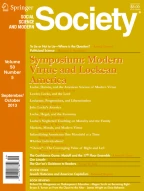
The founding myths and ideals have greatly shaped U.S. foreign policy since the emergence of the young republic. They constitute the framework within which institutional and non-institutional actors try to influence the decision-making process. But to provide a complete picture of U.S. foreign policy making, one has to take into account all the dimensions and parameters at all levels.
This is a preview of subscription content, log in via an institution to check access.
Price includes VAT (France)
Instant access to the full article PDF.
Rent this article via DeepDyve

Steven W. Hook, U.S. Foreign Policy, The Paradox of World Power (Washington, D.C.: The CQ Press, 2008), p. 15.
Hook, op.cit., p. 31. La Feber Walter, The American Age (New York: Norton, 1989), p. 10.Adam Quinn, U.S. Foreign Policy in Context, National Ideology from the Founders to the Bush Doctrine (London and New York: Routledge, 2010), p. 94.
Quinn, op.cit., p. 120.Zbigniew Brzezinski, The Grand Chessboard: American Primacy its Geostrategic Imperatives, (New York: Basic Books, 1997).
The White House, “The National Security Strategy of the United States of America,” 2002. Available at http://georgewbushwhitehouse.archives.gov/nsc/nss.2002/l/index.html/ accessed 13 April 2014.
Bayless Manning, “The Congress, the Executive, and Intermestic Affairs: Three Proposals,” Foreign Affairs, January 1977, pp. 306–324.
Nathan Glazer and Daniel Patrick Moynihan, eds., Ethnicity: Theory and Experience (Cambridge, Massachusetts: Harvard University Press, 1975).
Alexander DeConde, Ethnicity, Race, and American Foreign Policy: A History (Boston: Northeastern Press, 1992), p. 193.
Samuel P. Huntington, “The Erosion of American National Interest,” Foreign Affairs, September–October, 1997.
Tony Smith, Foreign Attachment: The Power of Ethnic Groups in the Making of American Foreign Policy (Cambridge, MA: Harvard University Press, 2000), p. 1.
Eric Uslaner, “Cracks in the Armor? Interest Groups and Foreign Policy,” in Allan J. Cigler and Burdett A. Loomis, eds., Interest Group Politics (Washington, D.C.: CQ Press, 2002), p. 356.
John T. Tierney, “Congressional Activism in Foreign Policy: Its Varied Forms and Stimuli,” in David A. Deese, ed., New Politics of American Foreign Policy (New York: St. Martin’s Press, 1994), p. 118.
Louis L. Gerson, The Hyphenate in Recent American Politics and Diplomacy (Lawrence: The University of Kansas Press, 1964).
Huntington, op.cit.Michal Clough, “Grass-Roots Policymaking: Say Good-Bye to the Wise Men,” Foreign Affairs, January–February, 1994.
John J. Mearsheimer and Stephen M. Walt, The Israel Lobby and U.S. Foreign Policy (New York: Farrar, Straus and Giroux, 2007), pp. 111–112.
Yossi Shain, Marketing the American Creed Abroad: Diasporas in the U.S. and Their Homelands (New York: Cambridge University Press, 1999).
Shain, op.cit., p. x.Salah Oueslati, “Les Lobbies Ethniques et la Politique Etrangère des Etats-Unis: ‘Double Allegiance’ ou Participation Démocratiques?” Annales du Centre de Recherche sur l’Amérique Anglophone, 2006, pp. 131–157.
Shain, op.cit, p. 12.Thomas N. Brown, “The Political Irish: Politicians and Rebels,” in David Noel Doyel and Owen Dudley Edwards eds., America and Ireland, 1776–1976: The American Identity and the Irish Connection, The Proceedings of the United States Bicentennial Conference of Cuman Merriman, Ennis, August 1976 (Westport and London: Greenwood Press 1980), p. 140.
Joseph O’ Grady, “An Irish Policy Born in the U.S.A.: Clinton’s Break with the Past,” Foreign Affairs, May–June, Vol. 75, No. 3, 1996, p. 2.
Andrew Greely, The Irish Americans, the Rise to Money and Power (New York: Harper & Row Publishers, 1981), p. 164.
Greely, op.cit., p. 97. Conor O’ Clery, The Greening of the White House (Dublin: Gill & Macmillan, 1996), p. 9. O’ Clery, op.cit., p. 27.Maria de Los Angeles Torres, In the Land of Mirrors, Cuban Exile Politics in the United States (Michigan: The University of Michigan Press, 2002), p. 59.
Sylvia Pedraza-Bailey, Political and Economic Migrants in America: Cubans and Mexicans (Austin: University of Texas Press, 1985).
Peter Wyden, Bay of Pigs: The Untold Story (New York: Simon & Schuster, 1979). Torres, op.cit., p. 60.William Leo Grande, “From Havana to Miami; U.S. Cuba Policy as a Two-level Game,” Journal of Interamerican Studies and World Affairs, Vol. 40, No. 1, 1998, pp. 73–74.
Torres, op.cit., p. 60.Patrick J. Haney and Walt Vanderbush, “The Cuban Embargo. The Domestic Politics of an American Foreign Policy,” Journal of Interamerican Studies and World Affairs, Vol. 40, No. 1, 1998, pp. 67–86.
Michal T. Hayes, Incrementalism and Public Policy (New York: Longman, 1992), p. 35.Robert O. Keohane, After Hegemony: Cooperation and Discord in the World Economy (Princeton (NJ): Princeton University Press, 1984).
Sophie Yeo, “Carter Slams Koch Brothers for funding Climate Denial,” Global Climate Change New & Analysis, 23 April 2014. Available at http://www.rtcc.org/2014/04/23/carter-slams-koch-brothers-for-funding-climate-denial/ accessed 16 May 2014.
Stephen M. Walt, Taking American Power: The Global Response to U.S. Primacy (New York: W.W. Norton, 2005), 197.